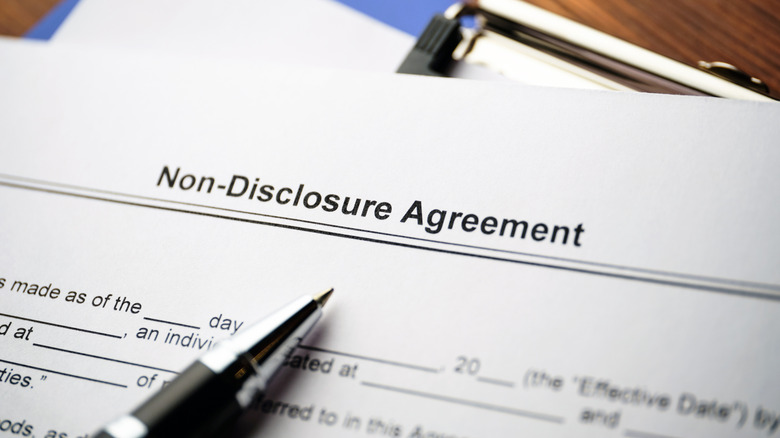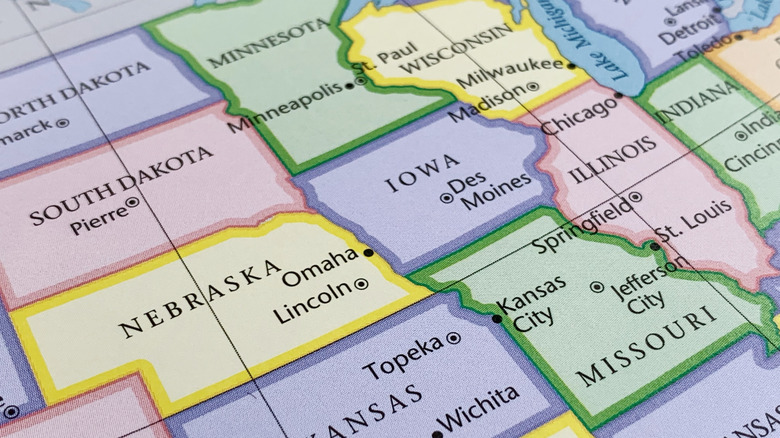What You Need To Know Before Signing An NDA
Non-disclosure agreements (NDAs) are a routine part of business life in the United States, yet many employees remain unaware of the legal specifications behind these documents. As with any legally binding document, it's crucial to understand what NDAs cover so you can better protect yourself. Also dubbed confidentiality agreements, these documents create an arrangement between two or more parties that agree to share privileged information without divulging it. In other words, NDAs create a professional relationship where business-sensitive details are passed among people who aren't allowed to share them with non-authorized parties.
Typically, businesses have potential employees sign these legal agreements to ensure their operations, information, or competitive edge cannot be stolen, replicated, or leaked. NDAs commonly cover client data, financial information, product or service specifics, or unique formulas. Although these confidentiality agreements have become commonplace, some private individuals or companies misuse them to keep individuals silent or to conceal questionable activity. NDAs should strike a balance between upholding a worker's dignity and upholding an entity's business interests.
Although specific numbers are challenging to determine, several reports have highlighted the widespread use of NDAs. According to a 2024 study by Syracuse University and the University of Maryland, about 57% of American employees have signed onto some form of a confidentiality agreement. Furthermore, up to 88% of U.S. businesses require candidates to sign an NDA before bringing them on board. Regardless of the standard, all employees need to understand the following before signing an NDA.
There are different types of NDAs
The difference between a startup and a small business might seem negligible, but even minor discrepancies can have considerable implications. The same is true when looking at varying types of NDAs. With every business facing unique challenges and setting specific goals, it makes sense that distinct confidentiality agreements would apply in discrete cases. Generally speaking, there are two kinds of NDAs: unilateral and mutual. It's vital to understand which one you're signing before opening yourself up to liability.
As the name suggests, a unilateral confidentiality document means only one entity is responsible for keeping certain information private. Usually, unilateral NDAs affect individual employees, private contractors, or even entire small businesses working with a larger company. These one-way agreements place the legal responsibility on one party. On the other hand, mutual confidentiality agreements impact more than one entity. Also referred to as a bilateral NDA, it requires all signed individuals or groups to maintain the confidentiality of the information covered.
One isn't inherently better than the other; it's merely important to know how an NDA affects you and a potential employer before signing on the dotted line. Keep in mind that these documents only cover information specifically mentioned in the agreement. Employers are still bound by other privacy laws to protect your personal information.
An NDA should be clearly defined
It's helpful to have a lawyer when writing a will, and businesses should take the same approach when writing an NDA. Still, some companies put excessively vague and overly broad confidentiality agreements in front of potential employees, assuming they'll sign it without pushing back – another reason to read everything before attaching your name to a legal document. An NDA shouldn't leave you scratching your head in confusion; these documents need to clearly define what information is deemed privileged, which parties are responsible for maintaining confidentiality, the timeline of the agreement, and potential penalties for violations. This way, all signatories are in clear agreement about what's included. Sometimes, companies opt to determine what is not confidential to make the agreements shorter.
Beyond clarity, NDAs also need to maintain relevance. A confidentiality agreement can be transparent about specifics while still covering too much ground. The scope of what you're expected to keep confidential should be pertinent to the role you're applying for, as well as the relationship you're entering into with a particular company. For example, it's unreasonable for a business to require its employees to conceal publicly available knowledge. Language that's too vague or overly broad risks undermining the enforceability of the entire agreement, but employees shouldn't take the risk. If you think an NDA casts too wide a net, ask the company to tighten it up a bit.
Laws regarding NDAs vary by state
Another crucial point you need to know before signing an NDA is the legality of these contracts. Both federal and state laws govern confidentiality agreements, and while federal regulations are standardized regardless of where a business operates, the state-level laws can vary. These regional stipulations are usually determined by where a business entity is legally incorporated, not by where an employee works. In general, an NDA is widely considered enforceable by all state governments if it covers boilerplate information and the balance is shared relatively equally between signatories.
Over the past few years, more and more states have been adopting legislation regarding the scope of NDAs. Although these restrictions seek to reduce the illegitimate uses of confidentiality agreements and limit abuses of power, they still represent a growing disparity in how NDAs are legally understood. So far, sixteen states have tightened up their laws regarding confidentiality agreements, and more are expected to follow suit. Even if you're from the hardest-working state in the U.S., you still want the most protection you can get from an employment contract. Therefore, it's important to know under which state your NDA is enforceable.
Illegal activity isn't covered by an NDA
While NDAs can seem surprisingly far-reaching at times, they're never permitted to cover illegal activity. However, some bad actors have been known to attempt to use NDAs to keep recruits from telling the authorities about shady activity. Even if you unwittingly sign a confidentiality agreement with a company that's conducting illicit activity, their illegal behavior nullifies the contract. In fact, you might bear some legal responsibility if you don't inform authorities, even if you're not directly involved.
The National Whistleblower Center warns employees about overly restrictive NDAs attempting to hide wrongdoing and outright crime. They recommend filling out a confidentiality form on their site or reaching out to an attorney. Regardless, it's ill-advised to continue working with a company that is engaged in suspicious business practices, as no NDA can protect them from prosecution or prevent you from speaking out. Not even the most professionally devised NDAs could guard against the worst financial crimes committed by celebrities: The law is clear.
Legality determines enforceability, not signatures
The fact that NDAs can't be used to hide illicit activity applies on a less-serious scale, too. Sometimes, employees include legally unenforceable contents within their confidentiality agreements. Maybe a business didn't consult a lawyer, or a legal representative decided to give a client maximum protection. However, as is the case with any legal document, the enforceability depends on the legality of the contents, not the fact that you signed it.
For example, a general employment contract cannot force you to work overtime hours for free, and a hypothetical signature agreeing to that stipulation doesn't override the illegality of not paying someone overtime. The same is true for confidentiality agreements, and courts won't uphold illegal clauses or unreasonable measures. At the same time, the inclusion of a legally questionable section doesn't void everything else. The rest of the agreement, insofar as it's permissible, will remain enforceable. This reality is clearly stated in many contracts as a severability clause. These common provisions highlight that, in the case of a court finding a particular part invalid, the rest of the document remains enforceable.
Both parties must willingly agree
Over the years, confidentiality agreements have expanded in usage and scope. In other words, more companies are using NDAs to cover more things. This means a steadily increasing number of job seekers are faced with these contracts before landing a new job. Instead of assuming you don't have a choice and signing blindly, you should be aware that a legally binding NDA must be agreed to willingly by both parties. It's perfectly legal for a business to require a potential employee to sign an NDA before hiring them, but you can't be coerced or deceived.
A potential employer isn't allowed to force you to sign a confidentiality agreement under threat or to purposefully mislead you, and this arm-twisting or misinformation doesn't always come in a conspicuous form. Coercion could be as simple as putting an arbitrary time pressure on the document's signing or tying the completion of the NDA to your compensation or status. In the same way, deception can be subtle, such as hiding a confidentiality agreement among other forms or employing unnecessary legalese to confuse. No matter how promising or high-paying the gig, think twice about working with someone who is using dishonest tactics.
NDAs should be time-bound
Time limitations are another crucial factor to know before signing an NDA. The overwhelming majority of confidentiality agreements outline how long the arrangement lasts, rather than requiring it to carry on for an indefinite period. Although specific timelines can vary based on industries, the current market climate, and the nature of the employment relationship, most NDAs endure for around one to five years. Normally, a confidentiality agreement will, at a minimum, survive throughout the duration of the employment contract. If you're renewing a commitment, your employer will probably have you sign a new NDA.
To protect their interests, businesses will sometimes try to extend a confidentiality agreement beyond what is reasonable. While it's common to have an NDA slightly exceed the termination of a contract, there should always be a time constraint on the agreement. Unless you're working in an extremely competitive, clandestine, or burgeoning industry where information is exceptionally sensitive, permanent NDAs are virtually unheard of. Furthermore, these indefinite clauses may be found to be unenforceable. Generally, you should always ensure an expiration date is built into the agreement before signing. Agreeing to an unreasonably extended NDA could keep you from getting employed in the same industry, severely limiting your future job opportunities.
Prior or public knowledge isn't enforceable
At its core, an NDA focuses on protecting a business's information. Federal and state laws give employers a great deal of latitude when determining what fits under the umbrella of confidential in these agreements. However, there are some important limitations you should know before signing an NDA. A business owner is only able to keep employees or contractors from sharing, disclosing, or misusing truly confidential information. You can't be barred from divulging something that you accessed before signing the contract, that was provided to you by a third party, or that's publicly available.
Of course, this doesn't keep some overly cautious employers from creating an exceedingly broad NDA contract. If you notice that the agreement attempts to cover knowledge, information, or methods you have already acquired or that you could get elsewhere, don't sign the contract and assume it won't hold up in court, even if it won't. Make sure the appropriate changes are made beforehand, and those business owners who are unwilling to adjust accordingly might not be worth working for. An attempt to get you to sign a one-sided agreement is a major red flag from an employer.
Breaking an NDA could cost you
NDAs are legally binding contracts, both on state and federal levels, which means violations can trigger a myriad of consequences. Understanding the full scope of these potential repercussions is vital before signing an NDA. First and foremost, you want to know what to expect if you accidentally break a confidentiality agreement. Secondly, you should ensure from the outset that the outlined penalties are reasonable. Generally, punishments for violating an NDA fall into financial or occupational buckets.
Employers can set specific monetary damages for specific breaches of a contract. These could be up to hundreds of thousands of dollars for more serious offenses, although most fall well below this threshold. Beyond clearly outlined charges, an NDA could open you up to financial damages and court fees incurred through litigation if an employer takes you to court. Depending on the nature of the case and the wording of the NDA, violators could end up having to foot a business's legal bills, too. The less tangible yet still impactful fallout from a breached NDA could be reputational in nature. Depending on the severity of the infraction, an employee could be fired from their role and suffer further occupational challenges when trying to find work.
Somebody will pay litigation fees
Surprisingly, you may not have to violate an NDA to be on the hook for legal fees. Many confidentiality agreements have a clause determining which party would be responsible for paying lawyer and court fees in the event of litigation. Before signing an NDA, you should know this financial burden doesn't automatically fall on the guilty party; in the U.S., plaintiffs are usually tasked with handling their legal expenses. In other words, by default, most NDAs require an employee and an employer to pay their respective legal costs separately. In rare cases, a business may strategically phrase a confidentiality agreement requiring the employee to cover all litigation expenses, although this is legally dubious.
What's more common, but just as potentially financially damaging, is the requirement for the losing party to compensate the winning party. For example, if an employer is taken to court for violating an NDA by sharing a business's client information, both parties would start by handling their legal fees independently. Yet, the employer would be required to repay the business's total costs if they were found to violate the confidentiality agreement. Unless you want to contribute to the high average income of lawyers, you should fully comprehend an NDA's fiscal implications before putting your name down.
Employee behavior can weaken an NDA
Contrary to popular belief, a confidentiality agreement isn't a truly one-way contract. It's true that standard, unilateral NDAs – which exist in the overwhelming majority of employee-employer relations – put more of an onus on the worker. However, a business owner's handling of sensitive or confidential information can weaken the enforceability of a contract. Obviously, companies enjoy much more freedom when handling their own trade secrets than their employees, but they still have some responsibility to uphold the confidentiality of this information. If the requirement to protect this secrecy isn't a shared responsibility across the board, an employer might have less sturdy legal legs to stand on.
Keep in mind that this aspect is usually only addressed following a breach of contract by an employee. Lawyers sometimes tackle the enforceability of an NDA by pointing to violations by the employer, but this is rarely approached for any other reason than to legally protect an employee. The potential for an employer's violation of a confidentiality agreement is much broader in mutual agreements. These bilateral NDAs legally bind both parties to handle privileged information in a certain way, putting much more of a burden on business owners.
NDAs can survive employment contracts
The period between leaving one job and looking for another is often a potent cocktail of emotions. There's anxiety and fear surrounding the temporary loss of income and the challenges of finding well-compensated and enjoyable work. On the other hand, there's excitement and hopefulness about chartering a new career path. Whether you were let go, reached the end of your contract, or left on your own, your responsibilities to your previous employer might not be over, as NDAs often survive employment contracts. Business owners have an interest in protecting their competitive edge and privileged information, especially as it pertains to recent employees.
It's commonplace to assume an NDA ends when your employment ends. However, many confidentiality agreements have survivorship clauses that extend past an employment termination, meaning you need to remain in compliance. Before you start considering whether it's the best time of year to look for a new job, it's a good idea to review your NDA to determine what you're required to uphold. Since this legally binding demand to maintain the confidentiality of certain information could impact future job opportunities, you should be clear about it before signing an NDA.
Understand your responsibilities upon termination
The end of an employment contract doesn't mean the end of a confidentiality agreement. NDAs are designed to survive professional relationships to ensure embittered or entrepreneurial ex-employees don't sell trade secrets to the highest bidder. Yet, simply not sharing this confidential information is usually insufficient to uphold your end of an NDA. Many agreements clearly outline how such privileged information should be handled upon termination.
Some contracts simply demand that confidential items be returned to the employer. This relatively straightforward requirement is often as simple as handing back tools, documents, or other private information you were given while working for a business. Where many employees get tripped up are clauses requiring signees to destroy their copies of confidential information. While this could be as simple as deleting a document, other business owners might have more convoluted processes in mind.
Unfortunately, more litigious business owners sometimes use these ill-defined clauses to pursue legal action against former employees. With information often disseminated across multiple communication channels, desktop programs, mobile applications, and cloud-based programs, it can be unreasonable to expect an employee to be able to keep track of and run down every iteration of every piece of confidential information. The burden of proof is enough to force many to give in to pressure. Throwing away financial documents could cost you money, but tossing out confidentiality agreements may cost you legally. Regardless, employees must understand the full scope of their responsibilities upon the end of their contract.













